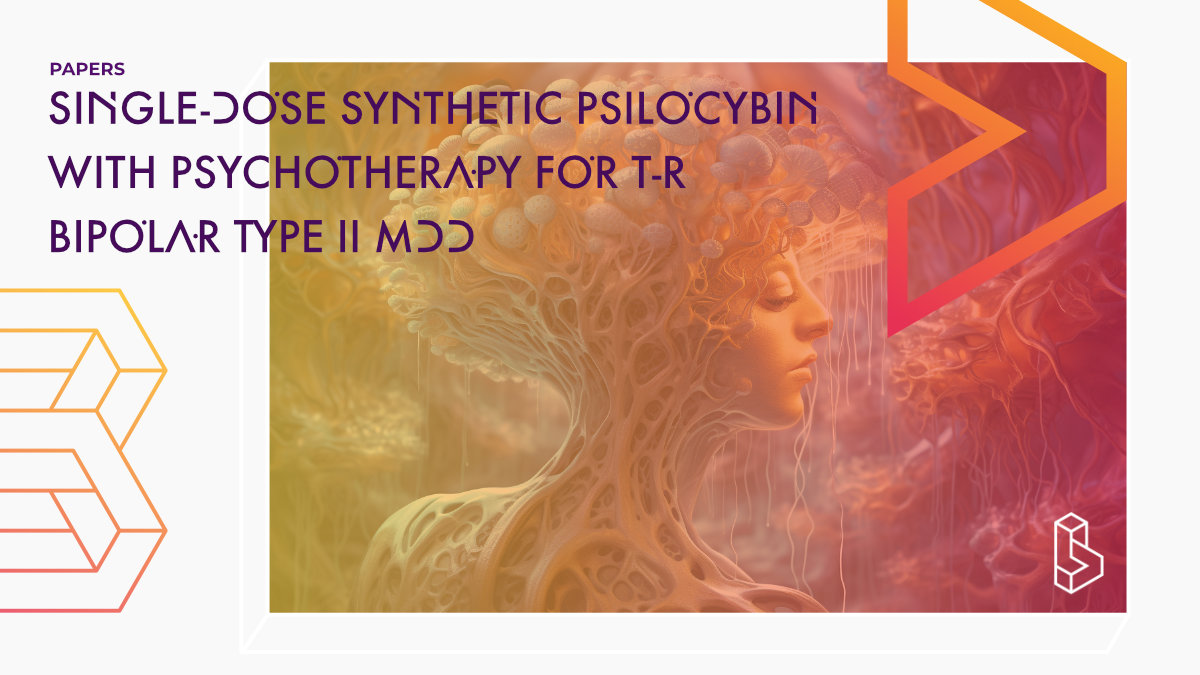This open-label trial (n=15) investigated the safety and efficacy of a single dose of synthetic psilocybin (25 mg) in patients with Bipolar II disorder (BDII) experiencing a current depressive episode. The study found significant improvements in depression (MADRS) scores at three weeks posttreatment, with 12 participants meeting the response criterion and 11 achieving remission. The results suggest the potential efficacy and safety of psilocybin with psychotherapy in treating BDII.
Abstract of Single-Dose Synthetic Psilocybin With Psychotherapy for Treatment-Resistant Bipolar Type II Major Depressive Episodes
“Importance Bipolar II disorder (BDII) is a debilitating condition frequently associated with difficult-to-treat depressive episodes. Psilocybin has evidence for rapid-acting antidepressant effects but has not been investigated in bipolar depression.
Objective To establish the safety and efficacy of psilocybin in patients with BDII in a current depressive episode.
Design, Setting, and Participants This was a 12-week, open-label nonrandomized controlled trial conducted at Sheppard Pratt Hospital. Participants aged 18 to 65 years with BDII, a current depressive episode longer than 3 months, and documented insufficient benefit with at least 2 pharmacologic treatments during the current episode were invited to participate. Of 70 approached, 19 met inclusion criteria and were enrolled. The trial was conducted between April 14, 2021, and January 5, 2023.
Interventions A single dose of synthetic psilocybin, 25 mg, was administered. Psychotropic medications were discontinued at least 2 weeks prior to dosing. Therapists met with patients for 3 sessions during pretreatment, during the 8-hour dosing day, and for 3 integration sessions posttreatment.
Main Outcomes and Measures The primary outcome measure was change in Montgomery-Åsberg Depression Rating scale (MADRS) at 3 weeks posttreatment. Secondary measures included MADRS scores 12 weeks posttreatment, the self-rated Quick Inventory of Depression Symptoms-Self Rating (QIDS-SR), and the self-rated Quality of Life Enjoyment and Satisfaction Questionnaire-Short Form (Q-LES-Q-SF), each completed at baseline and all subsequent visits. Safety measures included the Columbia Suicide Severity Rating Scale (CSSRS) and the Young Mania Rating Scale (YMRS) completed at each visit.
Results Of the 15 participants in this study (6 male and 9 female; mean [SD] age, 37.8 [11.6] years), all had lower scores at week 3, with a mean (SD) change of −24.00 (9.23) points on the MADRS, (Cohen d = 4.08; 95% CI, −29.11 to −18.89; P < .001). Repeat measures analysis of variance showed lower MADRS scores at all tested posttreatment time points, including the end point (Cohen d = 3.39; 95% CI, −33.19 to −16.95; adjusted P < .001). At week 3, 12 participants met the response criterion (50% decrease in MADRS), and 11 met remission criterion (MADRS score ≤10). At the study end point, 12 patients met both response and remission criteria. QIDS-SR scores and Q-LES-Q-SF scores demonstrated similar improvements. YMRS and CSSRS scores did not change significantly at posttreatment compared to baseline.
Conclusions and Relevance The findings in this open-label nonrandomized controlled trial suggest efficacy and safety of psilocybin with psychotherapy in BDII depression and supports further study of psychedelics in this population.”
Authors: Scott T. Aaronson, Andrew van der Vaart, Tammy Miller, Jeffrey LaPratt, Kimberly Swartz, Audrey Shoultz, Margo Lauterbach, Harold A. Sackeim & Trisha Suppes
Summary of Single-Dose Synthetic Psilocybin With Psychotherapy for Treatment-Resistant Bipolar Type II Major Depressive Episodes
Bipolar II disorder is a lifelong condition characterized by recurrent hypomanic and depressive epi-sodes. Despite treatment, patients with BDII are typically symptomatic most of the time, primarily experiencing protracted and difficult-to-treat periods of depression.
Treatment options are limited for patients with BDII depression, and most randomized trials of pharmacological treatments for bipolar depression do not include patients with BDII in sufficient number to independently test efficacy.
Psilocybin is a naturally occurring plant alkaloid derived from psilocybin mushrooms that creates a mind-altering effect. It appears to increase associative learning, cognitive flexibility, and neuroplasticity, and may have therapeutic properties in patients with major depressive disorder.
Find this paper
https://doi.org/10.1001/jamapsychiatry.2023.4685
Open Access | Google Scholar | Backup | 🕊
Cite this paper (APA)
Aaronson, S. T., van der Vaart, A., Miller, T., LaPratt, J., Swartz, K., Shoultz, A., ... & Suppes, T. (2023). Single-Dose Synthetic Psilocybin With Psychotherapy for Treatment-Resistant Bipolar Type II Major Depressive Episodes: A Nonrandomized Controlled Trial. JAMA psychiatry.
Study details
Compounds studied
Psilocybin
Topics studied
Bipolar Disorder
Depression
Study characteristics
Original
Open-Label
Participants
15
Humans
Institutes
Institutes associated with this publication
Sheppard Pratt Health SystemThis company doesn't have a full profile yet, it is linked to a clinical trial.
Compound Details
The psychedelics given at which dose and how many times
Psilocybin 25 mg | 1xLinked Clinical Trial
The Safety and Efficacy of Psilocybin in Participants With Type 2 Bipolar Disorder (BP-II) Depression.The primary objective of this study is to evaluate the efficacy of 25 mg of psilocybin under supportive conditions to adult participants with BP-II, current episode depressed, in improving depressive symptoms.

